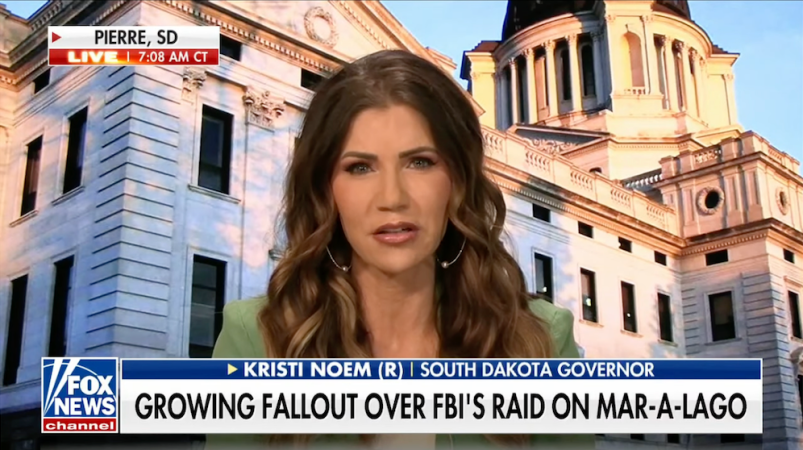Faced with photographic evidence of top secret material recovered at a private citizen’s home, a Twitter account representing Republican members on the House Judiciary Committee focused on… a TIME Magazine cover.
“That TIME Magazine cover was huge [sic] threat to national security,” the House Judiciary Committee’s Twitter account snarked Tuesday night, along with an emoji with eyes rolling.
It wasn’t clear why the Judiciary Committee Republicans didn’t offer a substantive response to news that federal prosecutors had recovered dozens of classified documents from former President Donald Trump’s home in Florida, and that they suspected a likely effort to obstruct attempts to recover the documents.
But the TIME Magazine distraction was representative of a broader trend: There’s no unified Republican message on the apparent federal criminal investigation into the president’s actions. And attempts to defend the President or attack the feds in the wake of raid-related revelations this time around have been uneven at best.
In the immediate aftermath of the raid earlier this month – when federal investigators recovered dozens of classified documents – a broad spectrum of Republicans compared the search warrant service to tinpot dictatorships and called for the defunding of federal law enforcement.
Now, by contrast, the Republican response to mounting evidence of potentially severe wrongdoing by Trump is muted and scattershot.
Senate Minority Leader Mitch McConnell, typically a weathervane of GOP lawmakers’ feelings, said Wednesday, “I don’t have any observations about that.”
Others did have observations to share – though none of them very sensical.
Boris Epshteyn – reported to be corralling Trump’s response to the raid as something of a “legal quarterback” – focused on the image of the documents itself, accusing the feds of wrongfully including a highly redacted photograph of evidence in a court filing.
Trump himself made this point a few hours after Epshteyn, before asserting without evidence to have declassified all of the classified documents the FBI had recovered.
Richard Grenell, who at one point served as Trump’s acting director of national intelligence before working to overturn the election results in Nevada, distinguished between Trump and Julius and Ethel Rosenberg, who were executed after being convicted of espionage… because Trump was once the President.
Perhaps the most perplexing take on the Mar-a-Lago situation Wednesday came from Taylor Budowich, a spokesperson for Trump, falsely claiming the court filing from federal prosecutors had conceded that “this unprecedented and unnecessary raid had NOTHING to do with any crimes, but rather a dispute over Presidential Records.”
It’s not clear how Budowich reached that conclusion. The document he referenced, a Tuesday court filing from federal prosecutors, at various points discusses “the government’s ongoing criminal investigation,” the potential “crimes” for which federal investigators obtained a search warrant, and “a criminal investigation into the handling of the records.” Two-thirds through the filing, prosecutors laid out the potential crimes again, explicitly:
DOJ is in the midst of an ongoing criminal investigation pertaining to potential violations of the Espionage Act, 18 U.S.C. § 793(e), as well as obstruction of justice, 18 U.S.C. § 1519, and unlawful concealment or removal of government records, 18 U.S.C. § 2071
Some Trump allies tried to cram a few different defenses into one jumbled response. Kristi Noem, the Republican governor of South Dakota with her own ethical concerns, offered one such effort Wednesday morning.
In an appearance on “Fox & Friends,” Noem claimed Americans “don’t trust the DOJ,” echoing Trump’s two-weeks-after-the-fact call for a “special master” to sort through the recovered materials.
“We don’t know what was in there,” she added next, after Fox News’ Steve Doocy pressed her on why Trump had highly sensitive material at his house more than a year after leaving the White House.
Then, in a pivot, Noem implied that we did know, and that these were classified materials that Trump had declassified: “President Trump declassified all this information,” she said.
Then, Noem went back: “What was in those documents and folders?” She was on her way to another point, implying that federal investigators or someone else may have planted documents.
“Do we know that that is really what President Trump brought to his home?” Noem wondered aloud. “Do we know that he put them there? Do we know what’s inside?”



